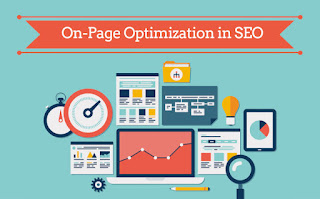On Page SEO
On-Page SEO is a factor that determines your site's optimization of search engines from its own website. On-page optimization aims for search engines to find out whether your website is relevant / in accordance with what users are looking for in search engines. And really the best quality. The key is there are 2 things, namely relevant and quality.
In SEO the concept of on-page optimization is the main thing that you must understand. The core of the on-page is simply so:
And as for certainly the reason why on page SEO optimization cannot be maximized
Search engines can find out whether visitors are satisfied with the page they are visiting. For example, if you visit a blog, but on the blog, the structure of the template structure, etc., is not organized, so you just click on it automatically, close the page. Because Google certainly wants to display a website that is satisfying for users, your website must satisfy visitors. There are several factors that affect the satisfaction of website users.
We will discuss it one by one from each of the following categories:
So many explanations from me about this post if there is a word or criticism that you can give a review in the comments. Thank you
SEO On-Page Concept
- High useful for visitors
- Facilitate visitors in conducting exploration
- Visitors feel at home in it
- Search engines understand the structure of your website
And as for certainly the reason why on page SEO optimization cannot be maximized
- The guidelines used are not up to date
- The guide used is less complete (half-half)
- Most guides on how to update On Page SEO updates and complete are still in English, so it's rare for those who want to read and practice it (due to language barriers) and also lazy to use google translate.
Search engines can find out whether visitors are satisfied with the page they are visiting. For example, if you visit a blog, but on the blog, the structure of the template structure, etc., is not organized, so you just click on it automatically, close the page. Because Google certainly wants to display a website that is satisfying for users, your website must satisfy visitors. There are several factors that affect the satisfaction of website users.
We will discuss it one by one from each of the following categories:
- Content. If you pay attention, content is the main thing in making a website. This means that you have the biggest role in on-page optimization. For example, quality content features include providing benefits, solving problems and providing solutions
- Keyword. Someone starts searching definitely based on keywords. Think like someone who has a problem then he wants to search. Then found the words that make people searching. Use those keywords to create content.
- Title. Make an interesting title so people can be interested in clicking and visiting your website. Because of the title someone will be easily curious about the contents.
- URL. Make a URL that describes the content, even better if it contains the main keyword
- Meta description. The Meta description is 1-2 sentences that appear in search results usually under the title tag.
- Picture media. Use images that relate and clarify the contents of the content. Make sure the best quality resousi images are not blurry.
- Outbound link. Links to other websites with good reputation and of course relevant will make your content reputation better.
- Internal link. Internal links (links between pages), so that visitors easily visit pages to other pages on your website. In this case the key is 1 content with other content connected to each other.
- Social sharing. Share your website so that more people know. The point is that more people visiting will increase the level of your website on Google Search
- Website speed.There are several things that can affect the loading speed including hosting, heavy page size, templates etc.
- Duplicate Title Tags. Other words duplicate in the title section, can reduce web performance on search engines especially if there are many. Title tags here are not limited to content titles, but can also be on title categories, tags, even attachment pages.
- LinkJuice. Linkjuice is the power of backlinks (inbound links) that enter a page. In a website, the biggest linkjuice is usually owned by the homepage. From this homepage linkjuice flows to another page whose link appears on the homepage (including external link).


Interesting post. I Have Been wondering about this issue, so thanks for posting. Pretty cool post.It 's really very nice and Useful post.Thanks ibmseotips
ReplyDelete